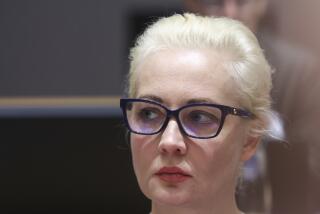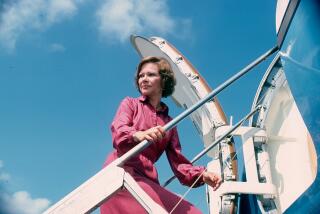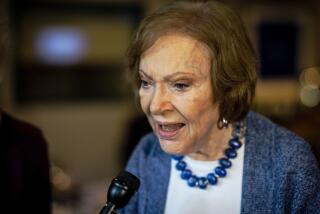THE WASHINGTON SUMMIT: Dealing With the New Reality : Will It Be Raisa vs. Barbara? : No Way, Say Capital Sages. They See the First Lady and Her Soviet Counterpart Becoming Chums.
- Share via
Imagine a repeat of First Wives’ feuding, with Washington and Moscow breathlessly following the competition.
Picture Barbara Bush prancing in stiletto heels, sheer black stockings and a silver fox coat. Or conjure up Raisa Gorbachev choked in pearls and sporting a silver pouf.
That prospect is enough to make some of the sages of Washington nostalgic for the days of former First Lady Nancy Reagan.
But there will be no fashion wars this time. No frosty asides, no one-upmanship, no bad blood boiling.
When the American and Soviet First Ladies meet this week as part of the superpower arms summit, Washingtonians-in-the-know say, Mrs. Bush and Mrs. Gorbachev will be perfect chums.
The First Lady watchers further predict that during the wives’ protracted contacts--including a trip to the Wellesley College commencement--there will be plenty of a kind of post-Nancy glasnost prevailing at the summit and related events.
“Barbara Bush is ‘unspattable,’ ” declared Ken Adelman, former director of the Arms Control and Disarmament Agency.
“Barbara can handle” Raisa, insisted Jayne Aikard, a Washington socialite.
“Surely, Mrs. Gorbachev has learned a thing or two,” sniffed Nancy Reynolds, a Reagan pal.
Although inquiring minds may be disappointed to learn that no rounds of First Wives’ fireworks will be anywhere in sight, the White House staff is simply glad Mrs. Reagan is not around to be upstaged. “Raisa just always got the best of her,” groaned one White House insider.
The scoring may not have been that neat, but no one can ignore that Mrs. Reagan and Mrs. Gorbachev had a Cold War of their own going at three of their husbands’ four superpower summits. If Nancy and Raisa were not provoking each other, the media were there to egg them on.
In contrast, First Lady watchers are confident that Mrs. Bush is too much a diplomat and has dealt with too many communists in her day to get into it with Mrs. Gorbachev.
“Mrs. Bush is an ‘earth mother,’ and even if there’s a problem you won’t hear about it,” said Sheila Tate, Mrs. Reagan’s former press secretary.
The official word from Mrs. Bush? It comes from her press secretary, Anna Perez: “I sincerely doubt there will be any problems between Mrs. Gorbachev and Mrs. Bush, given their past relationship with each other. Any other comparisons are odious in the extreme.”
The Gorbachevs and Bushes have met on several occasions, the first in 1985 at the funeral of Konstantin U. Chernenko, Gorbachev’s predecessor. At a tea after the funeral, Mrs. Gorbachev and Mrs. Bush positively hit it off, discussing their common interest in education, aides say.
But an attempt two years later by the Soviet Embassy, during a Washington summit, to arrange for Mrs. Bush to accompany Mrs. Gorbachev to a National Gallery exhibit, was apparently quashed by Reaganites, who wanted the vice president’s wife to stay in the background.
(Perhaps this explains why the Bush people have seen to it that Marilyn Quayle, wife of Vice President Dan Quayle, and oil magnate Armand Hammer will greet Mrs. Gorbachev Thursday at the opening of an exhibit of rare, historic Russian manuscripts at the Library of Congress.)
The last time Mrs. Bush and Mrs. Gorbachev were together was in December, 1988, at lunch in New York, when Mrs. Bush was First Lady-to-be.
Thursday, the initial summit ceremony at the White House will mark the first time Barbara Bush and Raisa Gorbachev share the spotlight as equals--wives of superpower leaders attentively waiting on the sidelines while their husbands take up the business of nuclear disarmament, a unified Germany and world peace.
Still, every word the women utter, their every gesture, their every outfit, will be scrutinized and analyzed by a pack of reporters following their every step.
“Only half the American public really understands the (arms) summit,” said Elaine Crispen, a public relations consultant who served as Mrs. Reagan’s press secretary from 1985 to 1988. “Americans want a safe world and want weapons put away. But they most enjoy reading about what the leaders do together and what they eat. More than anything, these summits are a window into what the Soviets are really like.”
For the most part, Americans have recovered from the shock of discovering that Mrs. Gorbachev--unlike previous Kremlin wives, who usually surfaced only at their husband’s funerals--is not a homely dumpling with a limited public role. Mrs. Gorbachev has toured the world at her husband’s side, and, certainly in Washington, the novelty of the modern, media-genic Soviet First Couple has worn thin.
But the lack of friction between Mrs. Bush and Mrs. Gorbachev--whom the jaded British tabloids have dubbed “Raisa the Russians’ Secret Weapon”--will not mean the First Wives will be doomed to anonymity during the Gorbachevs’ five-day visit, which will take them from Washington to California.
Mrs. Bush ensured she and Mrs. Gorbachev would capture their share of the spotlight by arranging for the Soviet First Lady to join her in donning cap and gown for Wellesley College’s commencement.
Almost one-third of the graduates at the elite school in suburban Boston had earlier criticized Mrs. Bush, saying she is an unfit role model and bad choice for commencement speaker because she acquired her fame through her husband, not on her own. Mrs. Bush dismissed that attack, in the form of petitions signed by about 150 Wellesley women, and promised to appear.
But she did not disclose until recently that before Easter she had sent a handwritten note to Mrs. Gorbachev, inviting her to come along; Mrs. Gorbachev accepted two weeks ago, agreeing to put in six minutes at the speaker’s podium.
“Barb has called those Wellesley girls and raised them one!” chortled socialite Aikard.
Said Tate of the Wellesley women: “They’re going to have the wives of two of the most powerful men in the world there, and if those over-privileged 22-year-olds don’t listen, they’re stupid. And I don’t know a woman around town who doesn’t agree with me.”
While Mrs. Bush is winning points from many for her savvy planning--as if her 84% approval rating in last week’s popularity polls needed a boost--her aides say she’s still a nervous wreck about her Wellesley speech.
More the sort to give a PTA talk than a grand oration, Mrs. Bush is at her best addressing smaller groups (like a few hundred congressional wives); she has not spoken to the huge international television audiences she is expected to receive at Wellesley, where the zealously publicized commencement has been moved from an ivy-covered quad to an open field sheltered by a giant tent with seating for 5,000.
Mrs. Bush, her staff says, has been asked by the Wellesley women to discuss how she copes with public life, how she achieved balance and fulfillment in her life, and why she made the choices she did.
All this lifestyle anxiety may prove baffling to Mrs. Gorbachev, best-known to Western diplomats for her authoritative lectures on socialist ideology.
In the Soviet Union, where women were declared equals after the 1917 revolution, the concept of feminism and role models does not preoccupy many women, who are “too busy worrying about the basics,” said Elena Zelinskaya, a journalist from Leningrad who was in San Francisco after a two-week summit between Soviet and American women.
“Soviet women spend much time doing home work,” she said in a telephone interview. “American women have more time to think about equality. The majority of our women really don’t want to be equal because they don’t want to work as a man. They want to stay home. But there is no choice. They have to work, sometimes doing heavy work of men, and they take care of the children.”
As for Mrs. Gorbachev, Zelinskaya spoke grimly: “For the first time, when Gorbachev became president, people discussed his wife. But now, five years later, we have so many economic problems, no one cares about the president’s wife and what she thinks. She is there for Western admiration.”
Unlike American women who admire their First Lady, many Soviet women have made no secret of resenting Mrs. Gorbachev’s privileges--her smart clothes and American Express card, as well as her self-assurance and aggressiveness.
Raisa Maximovna Titorenko met Mikhail Sergeyevich Gorbachev at a ballroom dancing class at Moscow University, where they both studied. After they married, they moved to Stavropol, a rural town 24 hours south of Moscow by train.
Mrs. Gorbachev had one daughter, Irina, but the Soviet First Lady never stopped working and sometimes made more money teaching political philosophy than did her husband. She has written three books. Her doctoral thesis covers two sovkhozes , or state farms, in the Northern Caucasus; the work includes an analysis of how the rural families spend their money.
In contrast, Mrs. Bush has neither finished college nor held a paying job. But she, too, followed her husband south--to Texas--for his career.
Unlike Mrs. Gorbachev--a tough-minded, outspoken woman who sits in on important policy meetings, freely gives advice and was even known to get appointed a controversial member of her husband’s cabinet--Mrs. Bush downplays her influence on her husband’s policies and politics.
If Mrs. Gorbachev had a closer personality counterpart, observers say, it was Mrs. Reagan, not Mrs. Bush. Mrs. Reagan, like Mrs. Gorbachev, was constantly involved in her husbands’ political life; she was known to participate in the making of key decisions and weighed in with her views on Cabinet appointments.
But, of course, she and Mrs. Gorbachev had their differences. . . .
Will there be a Nancy-Raisa scrimmage anew?
After leaving Washington and stopping in Minneapolis, where she will visit with a middle-class family, Mrs. Gorbachev and her husband will breakfast with the Reagans at the Soviet consul in San Francisco.
But the former President has reportedly groused about the planned session, saying it would occur on the Soviet leader’s turf, rather than in a more neutral setting; there has been no word about how Mrs. Reagan wants to stage the visit. Reagan spokesman Mark Weinberg would say only that, “I’m sure the Reagans are looking forward to the visit.”
Mrs. Reagan and Mrs. Gorbachev have always complained that the media exaggerated their differences, but they have never denied they existed. In her book, Mrs. Reagan says she had a “difficult relationship with Raisa” but felt that at their last meeting Mrs. Gorbachev was less abrasive. Mrs. Reagan then invited the Gorbachevs to visit California. “Believe it or not,” she wrote, “I meant it.”
Mrs. Gorbachev’s summit schedule will be less frenzied than in the past. She will attend summit ceremonies and dinners and will tuck in some Boston sightseeing while at Wellesley. But she declined Mrs. Bush’s invitation to visit colonial Williamsburg, Va., preferring to spend Saturday at casual Camp David.
While in California, she has told Soviet planners that she wants to meet Hollywood celebrities--besides the Reagans. But the names on her list (like Jimmy Stewart) suggest she may not be keeping up with the latest raves at American video stores.
Still, Mrs. Gorbachev--who officials announced Tuesday will dine Thursday with a group of “intellectuals,” including Jane Fonda and Ted Turner--won’t need to do much to keep pace Nina Khrushchev, the last of her Soviet predecessors ambitious enough to meet with her American counterpart, traveling to California and mixing it up with the stars.
In 1959, Mrs. Khrushchev, a bear-sized woman, met with a bevy of stars, including Elizabeth Taylor, Marilyn Monroe and Rita Hayworth.
She also met Frank Sinatra, the now-media reclusive star, who then told reporters that he thought Mrs. Khrushchev was a “darling, charming woman. . . . She seems to have a great wisdom and I’m not using my jazzy talk, either.”
More to Read
Sign up for Essential California
The most important California stories and recommendations in your inbox every morning.
You may occasionally receive promotional content from the Los Angeles Times.













